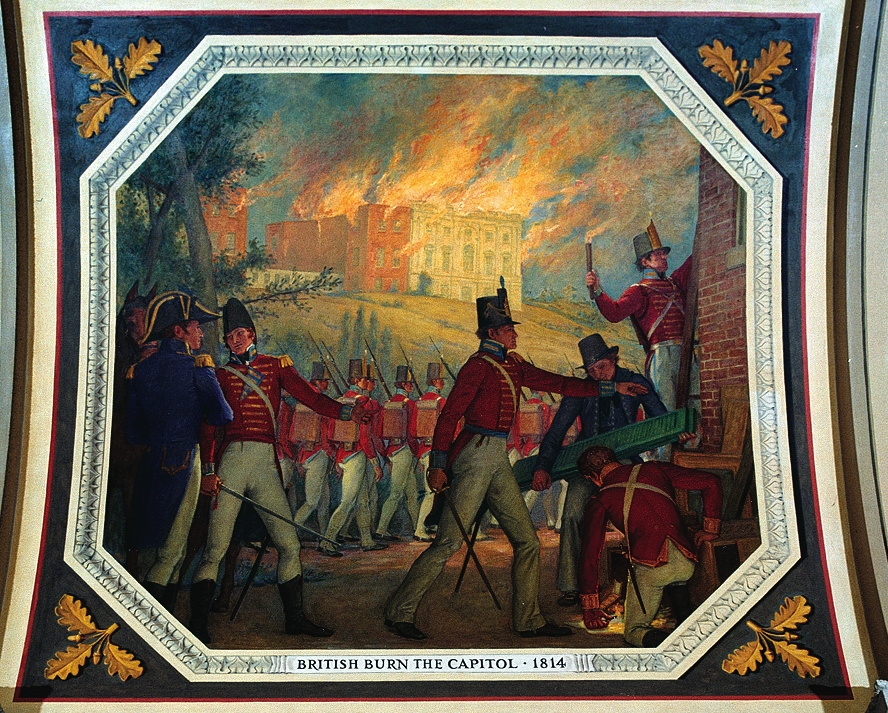Real quick–today I’ve posted on Go Teen Writers about what an editor at a publishing house really does. Check it out if you’re curious! https://www.roseannamwhite.com/2012/05/what-does-editor-do-anyhow.html
~*~
I’m nearing the end of my War of 1812 research, and several times I’ve been amazed at how the British commanders totally misunderstood the American spirit. They thought from the start that if they could just convince the Americans to turn on each other, if they could discourage us, then we would turn on our own cause and join theirs instead.
Boy, were they wrong.
I got my first chuckle when I saw how a good ol’ Maryland summer wreaked its havoc on the out-of-condition British troops, who had spent far too long on board their ships and hadn’t made an attempt to get back in shape upon landing, thinking it not worth the effort, more or less. The march toward Washington, made in 95 degree August heat–which means humidity that would have made it well over a hundred–felled more men than our troops did. Seasoned British veterans later said this march was the single worst time in their careers. (Oh yeah–go Maryland summers!)
We all know, of course, that they made it to Washington. To be sure, the British were a little baffled as to why it was left all but defenseless. But for our part, we couldn’t understand why they would make the effort to take a city of absolutely no strategic importance.
The answer? The British command wanted to hit us where it hurt. Burning Washington was meant to be a sucker-punch, meant to break our fighting spirit. But even their own people back home shook their heads when they got the news of the attack, one member of Parliament saying Britain “had done what the Goths refused to do at Rome.” He was echoing a London paper that had written, “Even the Cossacks spared Paris, but Englishmen spared not the capital of America.”
The British commander–hating America because his father had died at Yorktown in the Revolution–had crossed a line. And rather than break us, it made every individual American realize this war wasn’t against a nebulous idea of country–it was against them. For the first time, many citizens understood that our government couldn’t succeed without their support.
The burning of Washington achieved what no amount of pleas from our military commanders had been able to–it made the war hit home, and made it personal. In the week following, men volunteered by the thousand, and people finally determined that they would not suffer the British actions.
The British were in for another lesson too–that our government doesn’t rely on one location. Within two days of Washington’s burning, Congress and the Cabinet were back together and in action.
And boy, were we ready for action! =)
~*~
On a totally unrelated note, my watermelon cake. It was in some respects a total fail–the back completely fell apart as I iced it. But I hid the damage in a clever display (somewhat anyway) and got a couple decent pictures. And my grandmother, whose birthday we were celebrating on Memorial Day, got a kick out of it. (My grandparents own a produce farm, so…)




 Roseanna M. White is a bestselling, Christy Award winning author who has long claimed that words are the air she breathes. When not writing fiction, she’s homeschooling her two kids, editing, designing book covers, and pretending her house will clean itself. Roseanna is the author of a slew of historical novels that span several continents and thousands of years. Spies and war and mayhem always seem to find their way into her books…to offset her real life, which is blessedly ordinary.
Roseanna M. White is a bestselling, Christy Award winning author who has long claimed that words are the air she breathes. When not writing fiction, she’s homeschooling her two kids, editing, designing book covers, and pretending her house will clean itself. Roseanna is the author of a slew of historical novels that span several continents and thousands of years. Spies and war and mayhem always seem to find their way into her books…to offset her real life, which is blessedly ordinary.
Two days for the Cabinet and Congress to reassemble? I knew it was fast, but I did not realize that it was that fast!!
You cake looks awesome from the pictures. Making that cake took some serious talent…even if it did not stay together.
Thanks for that post on Go Teen Writers! I really enjoyed learning more about "that side" of the business. It will be helpful in looking at career options too. Thanks a lot!
People often underestimate the human spirit – especially the American one. Fascinating stuff! And I like that cake! Fun 🙂